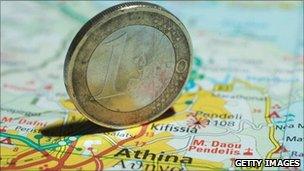Angela Merkel tries to allay Greece default fears
- Published

German Chancellor Angela Merkel has sought to calm market nerves over a possible Greek debt default, saying the eurozone must stick together.
The collapse of Greece and its exit from the euro would have a domino effect, she told German radio.
Her comments came after reports that Germany was preparing for Greece to potentially leave the euro.
Mrs Merkel is now set to talk on Wednesday with French President Nicolas Sarkozy and the Greek prime minister.
It was also revealed that Brazil, Russia, India, China and South Africa, the so-called Brics group of emerging economies, were going to discuss how they could help the eurozone.
Brazilian Finance Minister Guido Mantega said finance ministers and central bank presidents from the five nations would discuss the eurozone debt crisis at a meeting on 22 September in Washington.
He said: "We're going to meet next week in Washington, and we're going to talk about what to do to help the European Union get out of this situation."
'Big danger'
Fears of a Greek default caused sharp falls in shares on Monday, but markets ultimately rose on Tuesday.
Mrs Merkel told the RBB radio station: "The top priority is to avoid an uncontrolled insolvency, because that would not just affect Greece, and the danger that it hits everyone - or at least several countries - is very big.
"I have made my position very clear that everything must be done to keep the eurozone together politically. Because we would soon have a domino effect," said the chancellor.
At the weekend, German Economy Minister Philipp Roesler suggested that Greece would need an "orderly default" on its debts, a comment that sent global share prices tumbling on Monday.
European stock markets initially fell on Tuesday, with France's Cac index down 1.8% on fears that its banks, which are heavily exposed to Greece, have most to lose from a default.
However, markets ultimately closed up, with banks leading the gains.
France's Cac added 1.4%, with Societe Generale adding 15%.
The UK's FTSE 100 closed up 0.9%, with Royal Bank of Scotland rising 5.3%.
Austerity measures
Mrs Merkel noted in her interview that there was currently no formal procedure in the eurozone for an "orderly default" of a member state.
She said that Greece was getting its public finances on track. "Everything I hear from Greece is that the Greek government has hopefully seen the writing on the wall and is now doing some of the things that are required," she said.
Despite her attempt to soothe the markets, fears of an imminent Greek default pushed interest rates on the country's 10-year government bonds to over 24% on Tuesday.
Greece has received two international bailouts each worth about 110bn euros - although the second has still to be implemented - yet its financial health remains critical.
In recent days the government has promised several times to accelerate plans for public sector cuts.
On Sunday, Athens imposed a new, two-year blanket tax on property.
- Published12 September 2011
- Published7 September 2011